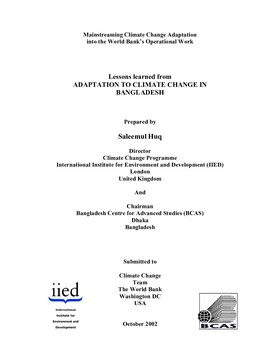Mainstreaming Climate Change Adaptation into the World Bank's Operational Work Lessons learned from Adaptation To Climate Change In Bangladesh
Document begins: Mainstreaming Climate Change Adaptation into the World Bank's Operational Work Lessons learned from ADAPTATION TO CLIMATE CHANGE IN BANGLADESH Prepared by Saleemul Huq Director Climate Change Programme International Institute for Environment and Development (IIED) London United Kingdom And Chairman Bangladesh Centre for Advanced Studies (BCAS) Dhaka Bangladesh Submitted to Climate Change Team The World Bank Washington DC USA October 2002 Lessons learned from Adaptation to climate change in Bangladesh By Saleemul Huq Summary Bangladesh, with a population nearing 130 million, is one of the poorest countries in the world while also being one of the most vulnerable to the impacts of climate change. Since the early nineties a number of studies have been carried out which have built a body of knowledge and information about the likely adverse impacts of climate change to different sectors of the country's economy. In 2000 the World Bank office in Dhaka initiated an effort involving international and national experts to use the existing body of analysis of climate change impacts and attempt to engage with stakeholders from the different vulnerable sectors of the country in order to try to mainstream adaptation to climate change into national planning. The World Bank published the ...
Cite this publication
Available at https://www.iied.org/g00088
